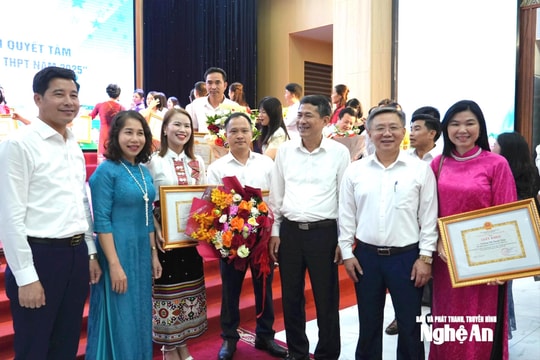The reason why the Ministry of Education and Training has not yet given the right to create high school graduation exam questions to the provinces
Regarding the draft to organize high school graduation exams from 2025, a representative of the Ministry of Education and Training explained why the authority to create high school graduation exam questions has not been given to localities.
 |
| Associate Professor, Dr. Huynh Van Chuong, Director of the Department of Quality Management (Ministry of Education and Training). Photo: Thanh Hung. |
Associate Professor Dr. Huynh Van Chuong - Director of the Department of Quality Management (Ministry of Education and Training) said that up to now, the Ministry of Education and Training has received many comments on the draft Plan for organizing the high school graduation exam in 2025. Previously, to develop this draft plan, the Ministry had many meetings with experts, asking for opinions from the Departments of Education and Training and teachers.
Sir, the Ministry of Education and Training is soliciting public opinion on the high school graduation exam plan from 2025. Could you share the new points that the Ministry of Education and Training wants to aim for in this draft plan?
The Ministry of Education and Training wants to emphasize three new points presented in the draft plan. Firstly, the construction of a question bank and the creation of test questions in the direction of assessing competencies in accordance with the 2018 General Education Program.
Second, the Ministry wants to emphasize career orientation through elective exams from students' chosen subjects, which helps to early orientate careers that are suitable to their abilities and interests. Third, according to the roadmap from 2025-2030, step by step, the Ministry of Education and Training will promote the application of information technology to organize exams on computers.
We expect that this plan will meet the requirements for graduation recognition; evaluate the quality of teaching and learning according to the progress of learners; and at the same time, the exam results will be reliable enough for universities and vocational training institutions to refer to for admission consideration and students will be given early career orientation.
One of the notable points of the plan is that History becomes one of the four compulsory subjects. Previously, whether History was an optional or compulsory subject was a hot topic of public opinion. Up to this point, what comments has the Ministry of Education and Training received on this issue?
Before deciding to make History one of the four compulsory subjects in the draft, the Ministry carefully considered and sought multi-dimensional opinions. This is the task of implementing Resolution 63/2022/QH15 of the 15th National Assembly, which clearly states "designing History in the High School Education Program, including both compulsory and optional parts in a reasonable and scientific manner, ensuring the highest efficiency in educating traditions and developing students' personalities".
Currently, the Ministry is receiving quite a lot of consensus opinions, especially from teachers and students in general schools. However, there are also some different opinions, especially in support of the History exam but need to change more the way of setting questions for this subject. The Ministry will accept these opinions, listen, synthesize and analyze them from many perspectives.
 |
Some public opinions say that the high school graduation exam should be easier; specifically, maximum authority should be given to the Departments of Education and Training from organizing the exam to creating the exam questions. What is the opinion of the Ministry of Education and Training, sir?
Currently, the Ministry has strongly and clearly decentralized the organization of high school graduation exams to localities. Localities, specifically the People's Committees of provinces/cities, are primarily responsible for organizing the exams in their areas.
The Ministry of Education and Training is in charge of issuing regulations, developing exam questions, and conducting inspections, checks, and supervision. In recent exams, especially in 2020, 2021, and 2022, this model has recorded many advantages, with increasingly specific decentralization and clear responsibilities.
As we know, there are currently differences between provinces and cities, from the capacity to create exam questions to the organization of assessment and construction of questions, while ensuring uniformity in quality, universality and similarity between localities is something that needs to be done carefully and with a roadmap.
To ensure consistency, the Ministry is still responsible for issuing examination regulations, creating exam questions, and conducting inspections and checks; other tasks are completely proactive and responsible for the localities. The Ministry will continue to focus on perfecting regulations and rules and conducting inspections and checks at both the Ministry and local levels so that the exam results are safe, objective and transparent.
The exam will closely follow the 2018 general education program, focusing on assessing capacity, with appropriate differentiation to ensure both graduation recognition and achieving many different goals.
According to annual practice, right before each exam, the Ministry of Education and Training will announce sample exam questions to serve as a basis for teachers and students to orient their review. The same is true for the high school graduation exam from 2025, before organizing the exam, the Ministry will announce sample exam questions so that teachers and students can be proactive in teaching, learning and reviewing for the exam.
In the draft plan, the Ministry of Education and Training sets out a roadmap from 2025-2030 to gradually organize high school graduation exams on computers. How is the Ministry preparing for this roadmap, sir?
Promoting the effective application of information technology to gradually organize exams on computers is in line with international trends and the current promotion of national digital transformation, including the education sector. This is an issue that the Ministry has discussed a lot, consulted with experts and is being built on a suitable and certain roadmap.
In 2025, 2026, 2027, the exam will continue to be held on paper; at the same time, the Ministry will conduct a limited trial of computer-based exams in a number of qualified localities. After a synchronous trial, with an impact assessment, and all conditions are met for each locality, the Ministry will consider a simultaneous implementation.
Therefore, schools and students can rest assured to study and review to participate in exams with the highest results. All policies have certain steps, causing no disruption.
Thank you!

.jpg)


.jpg)



